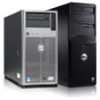Dell PowerEdge T605 Hardware Owner's Manual (PDF) - Page 163
Troubleshooting the Mouse, proceed to the next step.
 |
View all Dell PowerEdge T605 manuals
Add to My Manuals
Save this manual to your list of manuals |
Page 163 highlights
Troubleshooting the Mouse Problem • System message indicates a problem with the mouse. • Mouse is not functioning or is functioning improperly. Action 1 Check to see if the mouse cable has disconnected from the system. 2 Swap the faulty mouse with a working mouse. If the problem is resolved, replace the faulty mouse. 3 If other USB devices are connected to ports adjacent to the keyboard and mouse USB ports, power off the devices and disconnect them from the USB ports. An overcurrent event on another USB device will cause both the keyboard and mouse to stop functioning. If the mouse and keyboard do not immediately return to operation after disconnecting the other USB devices, restart your system. If the mouse and keyboard operations are restored after system restart, reconnect the disconnected USB devices and power them on one at a time. If mouse and keyboard operation do not return after system restart, proceed to the next step. 4 Reset the system BIOS to the default settings by setting the NVRAM_CLR jumper inside your system. Use the following procedure. CAUTION: Only trained service technicians are authorized to remove the system cover and access any of the components inside the system. Before performing any procedure, see your Product Information Guide for complete information about safety precautions, working inside the system and protecting against electrostatic discharge. a Turn off the system and attached peripherals and unplug the system from the power source. b Open the system. See "Opening the System" on page 68. c Remove the expansion card shroud. See "Removing the Expansion Card Shroud" on page 72. Troubleshooting Your System 163















